Femia > Health Library > Pregnancy > Pregnancy week by week > Entering week 12: Baby development, belly changes, and pregnancy care tips
Entering week 12: Baby development, belly changes, and pregnancy care tips
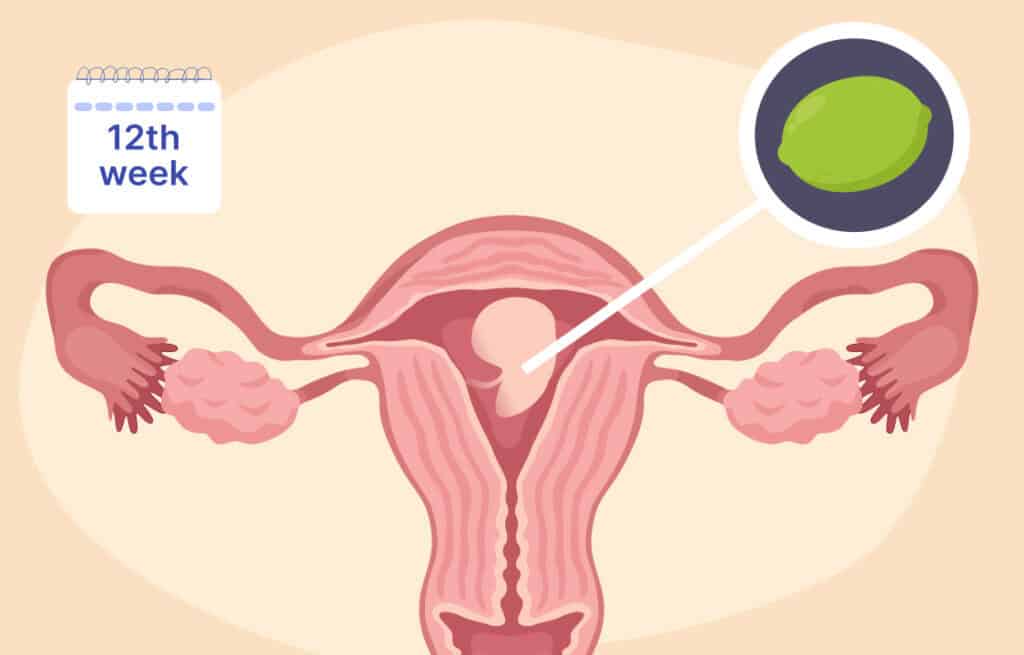
- Updated Feb 27, 2025
- Published
CRAFTED BY HUMAN
Crafted by human At Femia, we provide accurate and up-to-date information at every stage of your journey, from trying to conceive, pregnancy and postnatal support. All content is created by a real person based on in-depth research and own professional experience. Femia ensures that you will receive expert advice, strict accuracy and a personalized approach from our authors/medical experts. Learn more about our editorial policy.
FACT CHECKED
Fact checked At Femia Health, we maintain the highest standards of editorial excellence in delivering content focused on helping you conceive, guiding you through pregnancy, and supporting you postpartum. Explore our content review principles to learn how we ensure the accuracy and quality of our health and lifestyle tips for every stage of your journey.
At 12 weeks pregnant, your baby is developing rapidly, with most organs formed but continuing to mature. Movement is increasing, and you may notice symptoms shifting as hormone levels stabilize. Some moms-to-be might even spot the beginnings of a baby bump.
Reaching 12 weeks pregnant is an exciting milestone as you near the end of the first trimester. At this stage, your baby’s development is progressing quickly. Let’s explore what’s happening at week 12, how your baby is growing, and ways to care for yourself during this pivotal stage.
With Femia, you will get personalized insights every step of the way
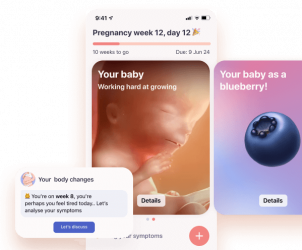
12-week pregnancy symptoms
Week 12 is often a time when symptoms start to transition, as hormone levels reach their peak. Here’s what you might feel:
Managing pregnancy stress
It’s common to feel stressed during pregnancy as you navigate the changes your body and life are undergoing. Worries about the baby’s health, finances, and what the future holds can contribute to stress. However, if the stress becomes constant or overwhelming, it’s a good idea to reach out to your healthcare provider, as prolonged stress may lead to anxiety or depression during pregnancy.
Dealing with headaches
Headaches often occur around the 12-week mark due to hormonal fluctuations. To alleviate them, try staying hydrated, eating small, frequent meals, getting enough rest, and practicing relaxation techniques such as yoga or deep breathing. If headaches persist, applying a warm or cold compress to your head or neck, and consulting your provider about safe medication options, can help.
Navigating food aversions
Changes in hormones and your heightened sense of smell may lead to food aversions, particularly to foods with strong smells or flavors like meat or coffee. This is temporary and often eases as you enter the second trimester. For now, stick to bland or cool foods, and ask your partner to help with cooking if food smells make you queasy.
Managing fatigue
Feeling tired throughout pregnancy, especially during the first trimester, is normal as your body works overtime to support the baby. As the second trimester begins, energy levels generally improve. To combat fatigue, engage in light physical activity, eat nutritious snacks, and take naps when needed. If fatigue persists, talk to your healthcare provider, as it could be a sign of anemia or depression.
Dizziness
Dizziness is common as your body adjusts to pregnancy, including an increase in blood volume and a faster heart rate. If you feel lightheaded, rest in a seated or lying position and ensure proper blood flow to your brain by lowering your head between your knees. If dizziness becomes frequent or severe, speak with your healthcare provider.
Shortness of breath
It’s normal to feel short of breath during pregnancy, as your body requires more oxygen to support the baby. The hormone progesterone helps expand your lung capacity, but pressure from your growing uterus may make it harder to breathe deeply. If you experience persistent shortness of breath or additional symptoms like chest pain or irregular heartbeat, contact your healthcare provider immediately.
👉Find out more: What’s happening at 11 weeks pregnant: Baby size, development, and self-care
Your body at 12 weeks pregnant
By the time you reach week 12, your uterus has expanded enough to rise above your pelvic bone, which may create a small but noticeable bump, especially for women with smaller frames. This is an exciting milestone, as your body begins to adjust to the growing baby, and you might notice a reduction in early pregnancy symptoms like nausea and fatigue.
As hormone levels begin to stabilize, many women experience a surge in energy and a decrease in mood swings. While you may still feel some discomfort from time to time, such as mild cramping or bloating, the second trimester is typically a time of increased well-being. Continuing to prioritize hydration, balanced nutrition, and taking prenatal vitamins will support both your health and your baby’s development during this time.
12-week pregnant belly
For some, the 12-week mark brings the first real sign of a baby bump as the uterus moves up and out of the pelvic area. If you’re pregnant for the first time, your bump may appear slightly later, while those in their second or third pregnancies might notice it earlier.
Baby development at 12 weeks pregnancy
At 12 weeks, your baby’s organs are fully formed and will continue to grow and mature. The fingers and toes are separating, and the bones are hardening. The intestines, which started developing outside the body, are moving into the abdomen, and reflexes like sucking are beginning to develop. The baby’s brain is now producing hormones, and the kidneys are starting to work.
- Tiny movements. At 12 weeks, your baby is starting to develop fine motor skills. They can now open and close their tiny hands into fists, and their toes are starting to curl, a sign of growing muscle coordination.
- Developing fingernails. Your baby’s fingers and toes are now sporting the beginnings of tiny fingernails. These delicate nails are growing quickly, adding to the intricate details of their developing body.
- Intestinal development. By 12 weeks, your baby’s digestive system is undergoing significant changes. The stomach and esophagus began forming earlier in pregnancy, and the intestines have grown rapidly, pushing into the umbilical cord. In the coming weeks, the abdominal wall will close, bringing the intestines into their proper position inside the abdomen.
12-week baby size
The 12-week fetus size is about 2 inches long, around the size of a lime, and weighs about half an ounce. Despite being small, the baby is becoming more active and will continue to grow rapidly in the coming weeks.
12-week ultrasound
A 12-week ultrasound often provides a detailed look at the baby’s development. Parents can usually distinguish basic features like the head, arms, and legs. While hints about the baby’s sex may be suggested, this is more reliably determined after 16–18 weeks, when the external genitalia are more clearly defined. A 12-week ultrasound 3D scan can provide a more detailed view, including possible movements as the baby stretches or turns.
Actual 12-week fetus
An actual 12-week fetus looks more human-like, with a well-defined head, torso, arms, and legs. The eyes are positioned forward on the face, and external ears are forming. The baby’s hands and feet are now more distinct, with fingers and toes clearly separated.

12 weeks pregnant: Tests to expect
- Combined first-trimester screening
Includes a blood test (PAPP-A and Free Beta-hCG) and nuchal translucency ultrasound to assess the risk of chromosomal abnormalities like Down syndrome and Edwards syndrome.
Purpose: Identifies higher-risk pregnancies and helps determine if further testing is needed.
Who should consider it? All pregnant women, especially those at higher risk. - Non-invasive prenatal testing (NIPT)
A blood test analyzing fetal DNA is typically done early in the first trimester but available later as well.
Who should consider it? It’s offered to high-risk pregnancies or parents seeking more precise genetic information.
👉Find out more:
Week 13 pregnancy: Fetal development, new symptoms, and bump progress
14 weeks pregnant: Baby’s size, bump beginnings, and self-care tips
Health tips and self-care at 12 weeks pregnant
Focus on nutrient-rich foods
A balanced diet is crucial during pregnancy. Prioritize lean proteins like chicken, fish, and legumes, and include whole grains, vegetables, and healthy fats such as avocado and nuts. These nutrient-dense foods will help support your energy levels, promote your baby’s growth, and ensure you’re getting the essential vitamins and minerals needed for a healthy pregnancy.
Daily hydration
Staying hydrated is vital during pregnancy to support increased blood volume, digestion, and energy levels. Aim to drink at least 8-10 glasses of water daily, and more if you’re active or experiencing swelling. Hydration also helps prevent constipation and supports amniotic fluid production.
Regular, light exercise
Incorporating regular, low-impact exercise into your routine can help improve circulation, boost energy, and reduce stress. Activities like walking, swimming, or prenatal yoga can help you stay active and feel more energized. Be sure to listen to your body and avoid overexertion.
Wear comfortable clothes
As your body changes, it’s important to wear clothes that support your growing bump and offer comfort. Loose, breathable clothing or maternity wear can help prevent discomfort as your body adjusts. Comfortable shoes with proper support can also alleviate pressure on your feet and lower back.
Questions from the Femia community
What is my daily calorie intake?
In the first trimester, most women don’t need extra calories, but a gradual increase of 300-400 calories per day is typical in the second trimester. Consult your healthcare provider for personalized guidance.
Why do I have food cravings?
Food cravings may be due to hormonal changes, nutrient needs, or increased appetite. Listening to your body is important, but aim to balance cravings with nutrient-rich foods.
How can I relieve constipation?
Staying hydrated, eating fiber-rich foods like fruits and vegetables, and regular, light exercise can help improve digestion and reduce constipation.
What is the 12-week rule in pregnancy?
The 12-week rule in pregnancy refers to the commonly held belief that the first trimester ends at 12 weeks, after which the risk of miscarriage significantly decreases. Many people use this milestone as a point to announce their pregnancy, though individual risks can vary.
The bottom line
At 12 weeks pregnant, your baby’s growth is accelerating, with organs developing rapidly and limbs becoming more defined. Many women experience shifts in symptoms as hormones stabilize and may even start to see the beginnings of a bump. Continue focusing on hydration, balanced meals, and light activity to support both you and your baby as you move toward the second trimester.
References
- “12 Weeks Pregnant: Symptoms, Baby Development & Tips.” BabyCenter, www.babycenter.com/pregnancy/week-by-week/12-weeks-pregnant.
- “Week 12 of Pregnancy: Symptoms, Baby Development & More.” What to Expect, www.whattoexpect.com/pregnancy/week-by-week/week-12.aspx.
- “12 Weeks Pregnant: Baby Development, Symptoms & Tips.” NHS, www.nhs.uk/pregnancy/week-by-week/1-to-12/12-weeks/.
- “Pregnancy Week 12: What to Expect.” American Pregnancy Association, www.americanpregnancy.org/healthy-pregnancy/week-by-week/12-weeks-pregnant/.
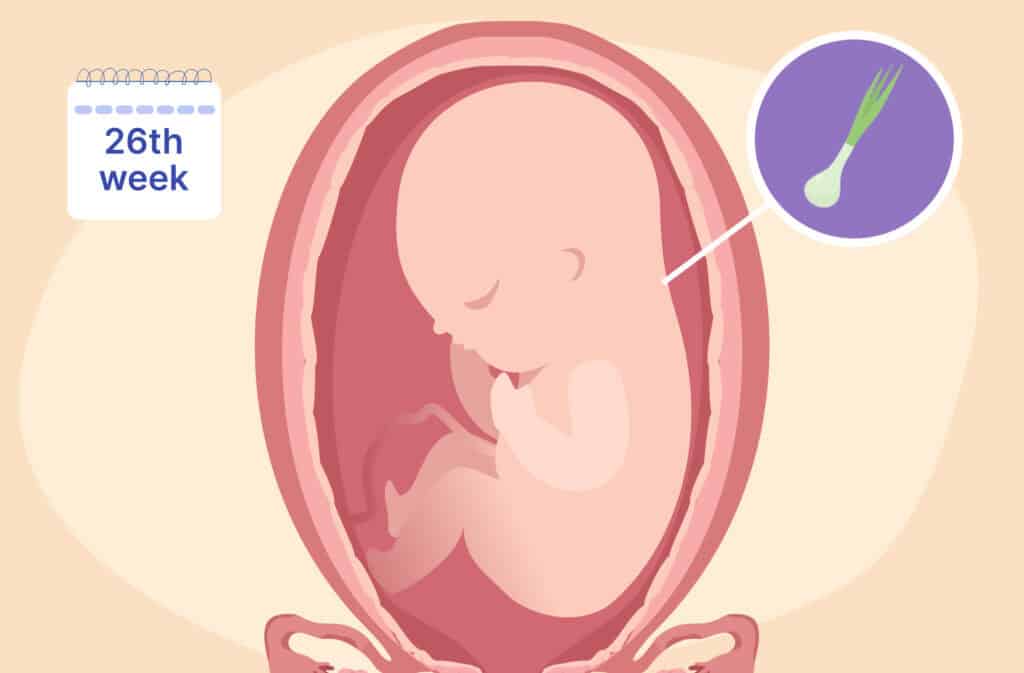
Discover what happens at 26 weeks pregnant, from baby’s development and size to symptoms and self-care tips for a smooth journey.
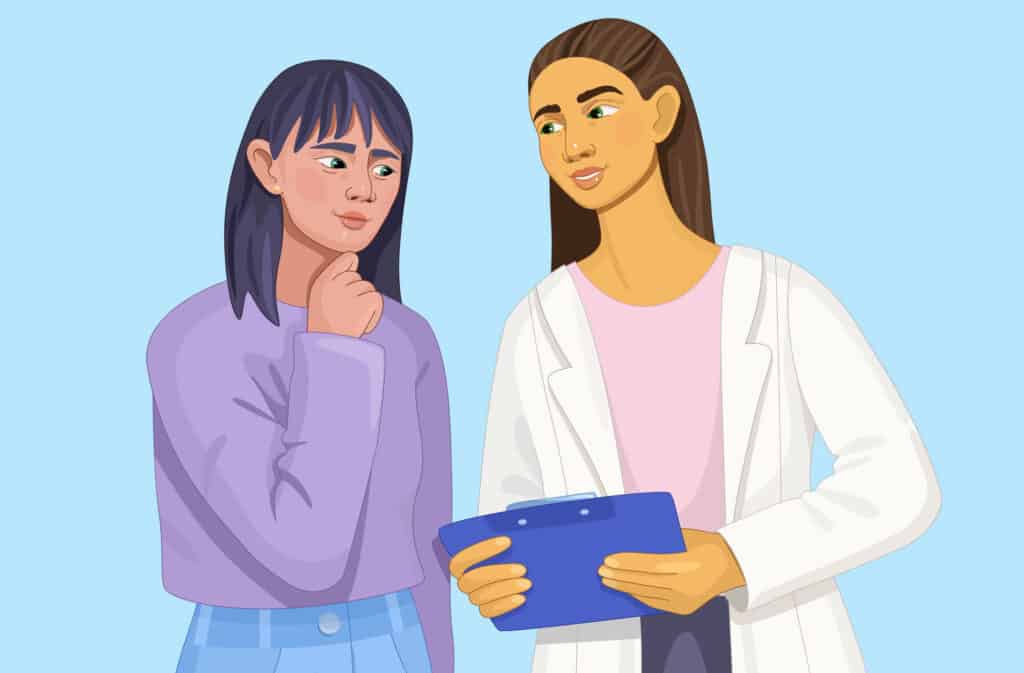
Discover the symptoms and causes of an anteverted uterus, its impact on fertility, and pregnancy. Learn why this common uterine position is not a concern for conceiving.
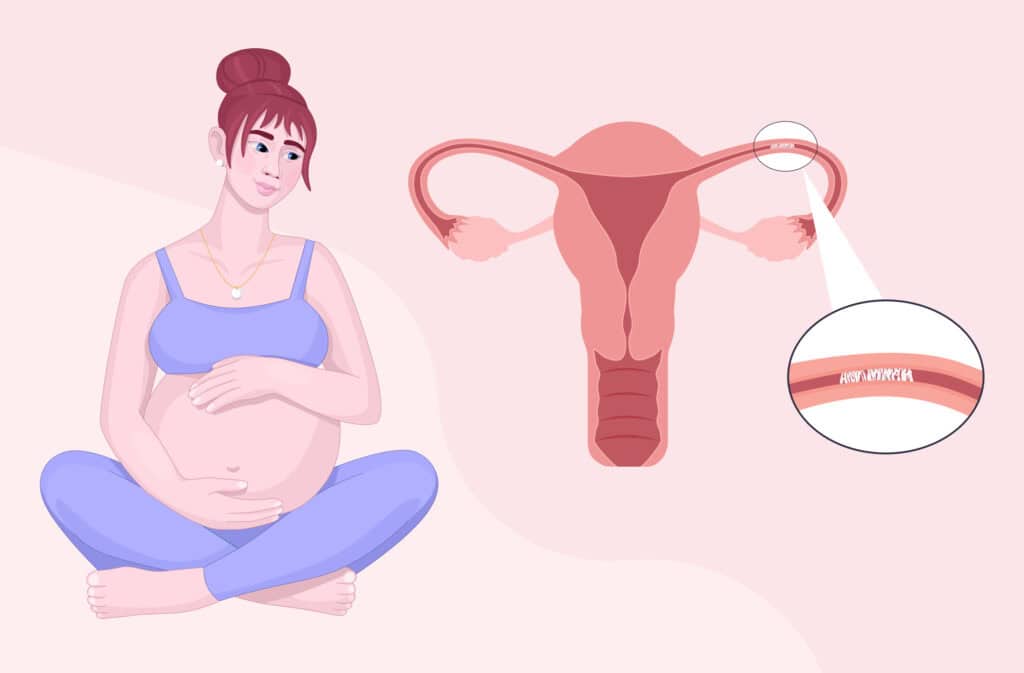
Discover how to get pregnant with blocked fallopian tubes in 7 steps. Learn about symptoms, treatments, and success stories. 30% of women face this – find hope and solutions here!

